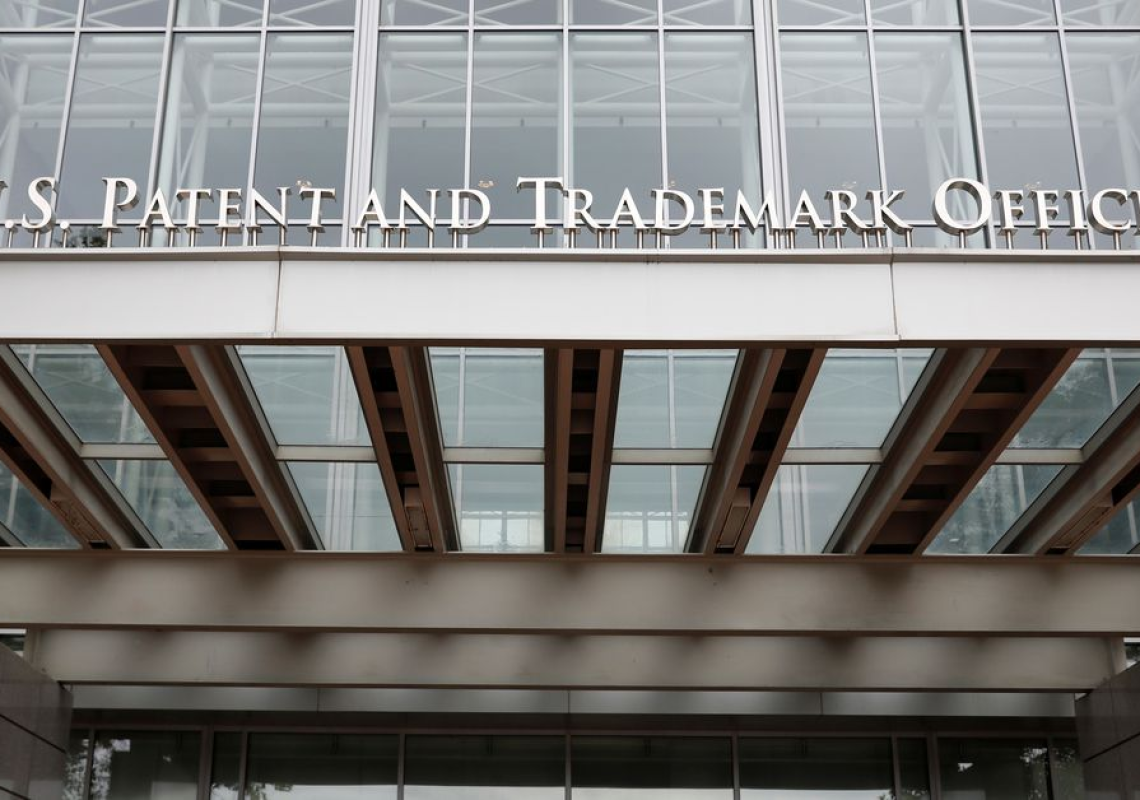Welcome to Reuters Legal News beta. Please enjoy and provide us with your feedback as we continue to improve the Reuters Legal News experience.
The United States Patent and Trademark Office (USPTO) is seen in Alexandria, Virginia, U.S., September 1, 2020. REUTERS/Andrew Kelly
(Reuters) – This year could bring big shifts in patent law, with a landmark U.S. Supreme Court case about patent eligibility, a new U.S. Patent and Trademark Office director, and significant changes to the PTO's Patent Trial and Appeal Board all potentially in store.
Will the Supreme Court or U.S. lawmakers take up patent eligibility?
American Axle and Manufacturing Inc v. Neapco is the biggest chance in years for the Supreme Court to take up the contentious question of when an invention can be patented. The case, involving an invention related to quieting noisy driveshafts, produced an even split at the Federal Circuit, and all of its judges have asked the high court to weigh in.
The confusion around patent eligibility could also inspire Congress to take action – a bipartisan group of U.S. senators said in a March letter that it was "past time that Congress act to address this issue."
Will legislation enable more patent challenges?
Democratic Senator Patrick Leahy of Vermont and Republican Senator John Cornyn of Texas have introduced a bill to facilitate patent challenges at the PTO's Patent Trial and Appeal Board, which Leahy said would help lower drug prices and deter so-called trolls from suing over weak patents. The PTAB has been broadly popular with big tech companies and others that often face infringement complaints, but less so with inventors and pharmaceutical companies that rely heavily on patent protection to prevent generic competition.
Leahy criticized former PTO director Andrei Iancu for acting to "hamstring" the PTAB, and wants to change an Iancu-era PTO rule that gave PTAB judges more discretion to deny petitions, leading to increased denials of patent reviews.
Leahy has also announced that he would retire in 2022, giving him motivation to move the bill quickly.
How would Kathi Vidal shape the PTO?
President Joe Biden's nominee to lead the PTO, Winston & Strawn partner Kathi Vidal, has offered little indication of her feelings about Iancu's policies, and noted that she's represented parties on both sides before the board.
While Leahy, the Senate Judiciary IP Subcommittee's chairman, opposes Iancu's PTAB changes, the subcommittee's ranking member, Republican Senator Thom Tillis of North Carolina, said in written questions to Vidal that he would oppose and put a hold on her nomination if she didn't commit to maintaining them.
If confirmed, Vidal will also have more power over the PTAB than previous PTO directors, following a June Supreme Court decision that gave the director authority to review PTAB decisions directly.
Will questions over West Texas' patent hotspot come to a head?
U.S. District Judge Alan Albright has made his Waco, Texas, court the most active court in the country for patent cases. Some say Albright's policies attract "trolls," and aren't happy about his court's prominence.
The Federal Circuit has ordered him to transfer cases several times, and Leahy and Tillis bothcriticized the "extreme concentration" of patent cases in his court. They asked the Judicial Conference of the United States to study the issue and suggest potential reforms.
Will patent battles over COVID-19 vaccines come to a boil?
Moderna may be facing at least two patent lawsuits over its COVID vaccines. The company and the National Institutes of Health disagree on whether government scientists should get credit on a recent vaccine patent application, with the federal government implying it may sue. And the Federal Circuit recently denied a Moderna bid to invalidate Arbutus Biopharma patents related to mRNA technology, which Moderna has said may be used in a future lawsuit against it.
Pfizer was sued in 2020 by San Diego biotech company Allele Biotechnology and Pharmaceuticals over allegations that its COVID vaccine infringes a patent covering a fluorescent protein. A trial in that case is set to begin in San Diego a year from now.
President Biden has also continued to push for the World Trade Organization to waive IP protections related to COVID vaccines in order to increase production.
Our Standards: The Thomson Reuters Trust Principles.
Washington-based correspondent covering court cases, trends, and other developments in intellectual property law, including patents, trademarks, copyrights, and trade secrets. Previous experience at Bloomberg Law, Thomson Reuters Practical Law and work as an attorney.
Subscribe for our daily curated newsletter to receive the latest Reuters legal news and headlines delivered to your inbox.
Reuters, the news and media division of Thomson Reuters, is the world’s largest multimedia news provider, reaching billions of people worldwide every day. Reuters provides business, financial, national and international news to professionals via desktop terminals, the world's media organizations, industry events and directly to consumers.
Build the strongest argument relying on authoritative content, attorney-editor expertise, and industry defining technology.
The most comprehensive solution to manage all your complex and ever-expanding tax and compliance needs.
The industry leader for online information for tax, accounting and finance professionals.
Access unmatched financial data, news and content in a highly-customised workflow experience on desktop, web and mobile.
Browse an unrivalled portfolio of real-time and historical market data and insights from worldwide sources and experts.
Screen for heightened risk individual and entities globally to help uncover hidden risks in business relationships and human networks.
All quotes delayed a minimum of 15 minutes. See here for a complete list of exchanges and delays.
© 2021 Reuters. All rights reserved






